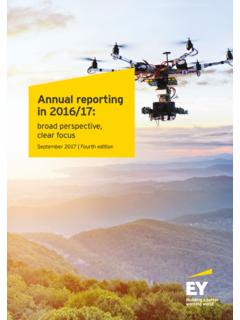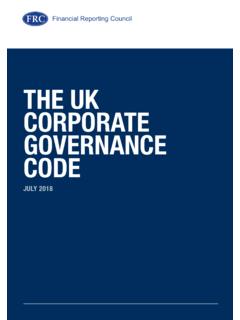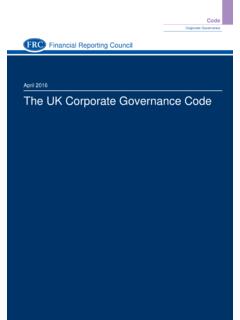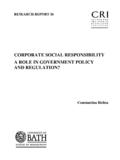Transcription of The impact of Brexit on corporate reporting - EY
1 What does Brexit mean for corporate reporting ?Last year, most companies considered it too early to provide any specific commentary in their periodic reporting on the impact of Brexit . Some companies referred to the uncertainty it had caused but many stayed then, the UK Parliament has voted in favour of triggering Article 50, and on 29 March 2017, the UK Government duly gave the requisite notice, initiating a two year process for the UK leaving the EU. This means that the process of Britain leaving the EU is now legally in place. Following an eight week gap due to the UK General Election, negotiations between the UK and the EU began on 19 June.
2 The deadline for concluding the talks remains as 29 March 2019. Companies who are planning their 2017 interim financial statements or Annual Report and Accounts (ARA) will need to consider the implications. Whilst not all companies will be impacted by Brexit , it is important for boards and audit committees to consider the reporting implications, if any, in order to comply with regulatory have summarised the key requirements and guidance sources that should be considered in making this determination. Interim management reports in half-yearly financial reportsUnder the Financial Conduct Authority s Disclosure Rules and Transparency Rule (DTR), the interim management report must include.
3 An indication of important events that have occurred during the first six months of the financial year, and their impact on the condensed set of financial statements A description of the principal risks and uncertainties for the remaining six months of the financial yearIn light of these requirements, preparers and audit committees will need to consider whether the Brexit decision and the ensuing process, including the triggering of Article 50 in March 2017, had an impact on the condensed interim financial statements and also challenge whether the principal risks and uncertainties disclosed in the last ARA remain valid or whether some additional risk disclosures are warranted.
4 The impact of Brexit on corporate reportingConsiderations for preparers and audit committeesJuly 20172| The impact of Brexit on corporate reporting J uly 2017 Narrative report within the ARAR equirements under Companies Act s414C: The Strategic Report must contain:Considerations for boards and audit committees A fair review of the company s business The review required is a balanced and comprehensive analysis of the development and performance of the company s business during the financial year and its position at the end of the year Consider whether Brexit has had an impact on the current year s performance and development, and if so, disclose its impact in a balanced manner.
5 A description of principal risks and uncertainties Consider whether the impact of Brexit represents a change to principal risks in of itself or indirectly, , manifests itself within other risks such as increased foreign exchange risk. The Financial reporting Council published reminders in July 20162 which drew attention to the following: Directors should consider the nature and extent of risks and uncertainties arising from the result of the Referendum and the impact on the future performance and position of the business. Those which the board judge to be principal risks and uncertainties should be disclosed and explained.
6 Company-specific disclosures are important in understanding how those risks and uncertainties are relevant, given the specific facts and circumstances of the company. Boards should be encouraged to provide an explanation of any steps that they are taking to manage or mitigate those risks. Information on the main trends and factors likely to affect the future development, performance and position of the company s business (to the extent necessary for an understanding of the development, performance or position of the company s business) Where relevant, companies should include some forward-looking analysis and discussion on the likely impact Brexit on the future performance and development.
7 This could feature in a CEO s review or a markets overview section of the ARA. Considering the key requirements of the Companies Act 2006 (in respect of the contents of a Strategic Report) and the corporate Governance Code, preparers and audit committees should consider the following in analysing whether and where the impact of Brexit should be disclosure considerations: Business model and strategy: Brexit could have a direct material impact on some companies business models. In some industries, , airline, food and hospitality, automotive, manufacturing, financial services, the impact may be more pronounced. Boards need to consider whether specific negotiating issues such as access to the customs union ( , changing the costs of imports, etc.)
8 ,) or access to the EU labour market may impact their business model and consequently whether some disclosures are warranted, , on how specific Brexit issues have affected/will affect their business model, the impact this has/may have on their ability to deliver their strategy and their plans to change/adapt their business model. Basis of preparation of financial statements: Directors should consider whether disclosures of material uncertainties are needed or whether the going concern basis of accounting remains appropriate. For example, if the ability to obtain finance/re-finance may be affected by risk aversion from lenders during this time of market uncertainty.
9 Viability statement: Directors3 should also consider whether there is an impact on the viability statement. For example, if there is a new/heightened principal risk that has arisen as a result of Brexit which impacts the company s solvency or liquidity this will need to be considered in their scenario planning and stress testing. Equally disclosures on assumptions underpinning the viability assessment may need to be reviewed and revised ( , the viability assessment could be underpinned by an assumption made by directors on the likely outcome of the Brexit process).3 The impact of Brexit on corporate reporting July 2017 |Recoverability of assets and other balance sheet measurementsThe assumptions used to determine the recoverability of assets are put into sharper focus by economic uncertainties such as those arising from or heightened by Brexit .
10 This is particularly relevant for goodwill, intangible assets and property plant and equipment where cash flow forecasts used in value-in-use calculations should be based on the most recent budgets and forecasts, taking account of these uncertainties. For finate life assets, these uncertainties could trigger impairment reviews of assets that are not normally tested for items are measured at fair value, for example investment properties or equity securities, or impairments of non-financial assets are based on fair values, the assumptions used should make maximum use of market-determined inputs. For example, foreign exchange rates should be based on spot or forward rates at the reporting date, not expectations of what those exchange rates might be in the addition, forecasts of taxable profits used to support the recognition of deferred tax assets should reflect any changes to the economic outlook for the relevant business that have been brought about or heightened by Brexit .
















